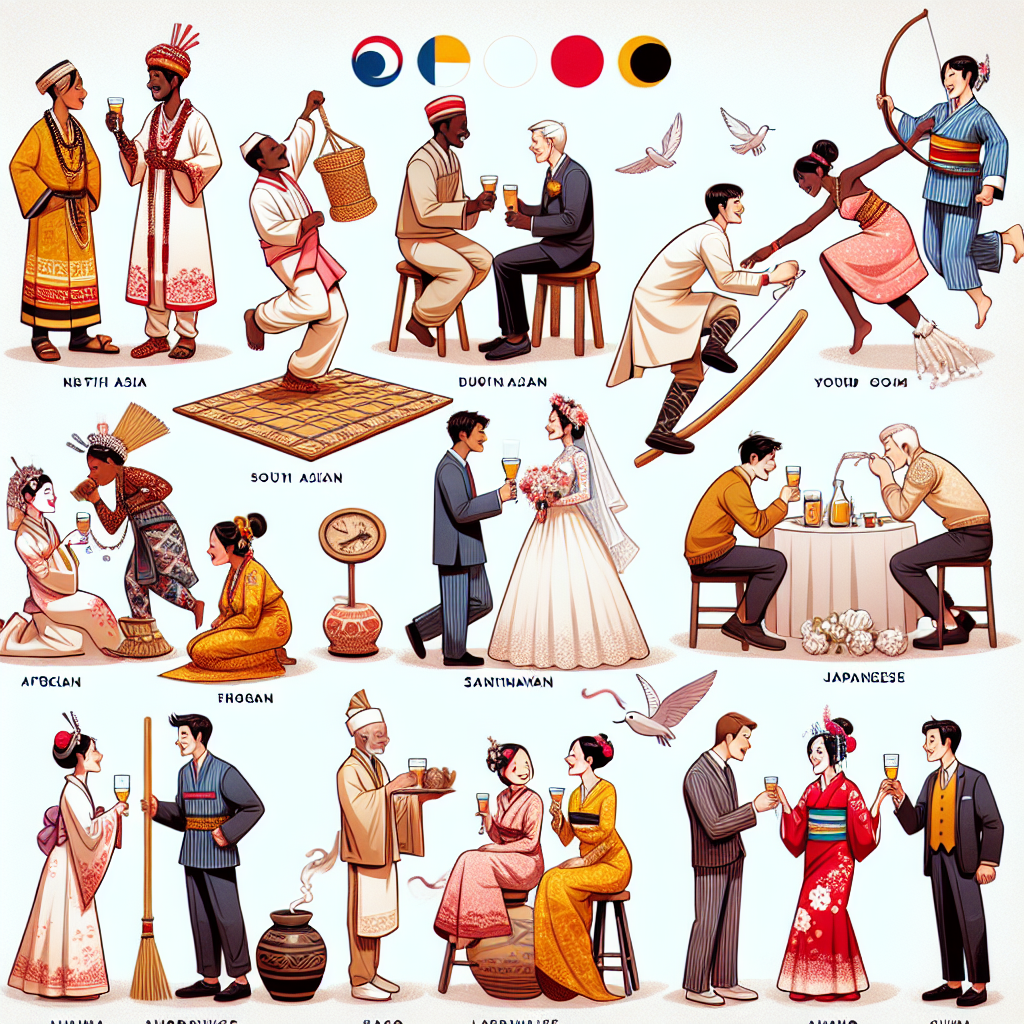15 Unique Wedding Traditions From Around the World

While you may be familiar with the American traditions of marriage—the bride wearing white, a couple exchanging rings, and vows that end in “I do”—there are endless unique wedding traditions around the world that symbolize the union of two people in love. Whether it’s going without bridesmaids, or even rethinking the classic white wedding dress, below, discover 16 of the most unique wedding traditions from around the world.
Germany – Polterabend
In Germany, on the night before the wedding day, the couple can host a polterabend, a celebration where guests smash porcelain—usually in front of the bride’s home—to ensure good luck for the couple’s marriage. Following the fête, the couple cleans up the broken shards to ward off evil spirits, symbolizing their ability to face hardships together in their married life.
Cuba – Money Dance
The money dance is a wedding tradition found in many cultures, and manifests differently depending on the region. In Cuban wedding parties, every gentleman who dances with the bride is expected to pin money on her dress, a celebratory gesture that contributes to the newlyweds’ honeymoon and other wedding expenses.
Greece – Koumbaro
In a traditional Greek wedding, the koumbaro, or best man, is tasked with the most important groomsman role. It involves carrying out a wet shave for the groom on the morning of the ceremony, symbolizing their shared trust that goes beyond surface-level friendship.
Hungary – Menyecske Ruha
At a Hungarian wedding, the bride might change into a new red dress at midnight called a menyecske ruha, known as the “new wife dress,” to symbolize that she is now officially married.
Scotland – Quaich
A quaich ceremony is a toast reserved for the newlyweds in Scotland, featuring a two-handled cup called a quaich. The symbolic act of exchanging sips encapsulates the unity of the bride and groom’s family.
Italy – Bomboniere
At an Italian wedding, the newlyweds often gift their guests with small party favors known as Bomboniere, which symbolize good luck and the shared love of family life.
Iran – Sofreh Aghd
During a Persian wedding ceremony, a couple will sit in front of a Sofreh full of meaningful items representing the shared journey of life they will embark upon.
Mexico – Lazo
At a Catholic Mexican wedding, a unity ceremony with a lasso, or lazo, takes place to symbolize the couple’s commitment to each other and the intertwining of their lives.
China – Bow and Arrow
At Chinese wedding ceremonies, the groom will genially shoot his bride with a bow and headless arrows three times to ensure their love story is forever.
India – Haldi
Before an Indian wedding ceremony, the bride and groom participate in a pre-wedding ritual called the haldi where a turmeric paste is applied on them to ward off evil spirits and purify the skin.
Peru – Cake Pulling
In Peruvian wedding receptions, the wedding cake includes charms attached to ribbons, with the lucky single woman who pulls out a faux wedding ring destined to be the next to marry.
Morocco – Hammam and Henna
Pre-wedding rituals in Morocco include a hammam spa day for the bride and her inner circle, followed by a henna party where the bride receives adornments for good luck.
Japan – San-san-kudo
Traditional Japanese wedding ceremonies may include the San-san-kudo ritual where the couple takes sips from sake cups, symbolizing the blending of families and individual lives.
Korea – Paebaek
In a Korean wedding ceremony, the paebaek is a significant moment where both sets of parents offer blessings and monetary gifts to the couple, symbolizing their future children.
Sweden – Kissing Tradition
In Sweden, a playful custom allows other women to give the groom a peck when the bride steps away, adding a fun element to the celebration.
These unique wedding traditions from around the world showcase the diversity and beauty of different cultures coming together to celebrate love and unity.
